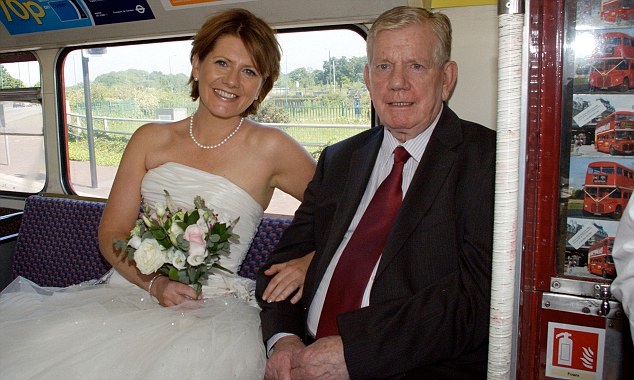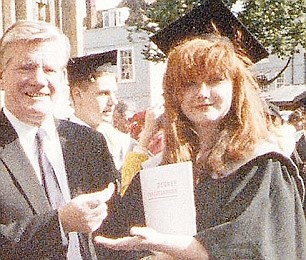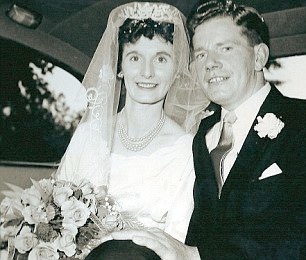'How will we live without Dad?': Actress Jackie Clune on coping with the death of a parent
By Jackie Clune
Last updated at 8:01 PM on 18th June 2011
Even though Jackie Clune’s father was elderly and in poor health, his death came as a profound shock. Here the actress recalls the moment she had spent her adult life dreading

Jackie with her father on her wedding day in May 2008
At 9.15am on Sunday 25 July 2010 my life changes for ever. My younger brother Adrian’s name flashes up on my mobile and wakes me in my hotel room. Strange. He doesn’t call often and when he does it’s never so early. A gut instinct that this is bad news tells me not to answer, so I hit ‘Don’t Accept’ and wait. I don’t know what I think this will achieve but in my sleepy stupor after a hard week in Cork in the touring production of Mamma Mia!, I want to buy myself a few moments to wake up. Two minutes later he rings again and says the words I’ve spent most of my adult life dreading.
‘Dad’s had a massive heart attack. He’s in intensive care. It’s 50-50.’
Shock and panic are badly acted. This is what I find myself thinking as I try to pack a bag and book a flight back to London. There is no screaming, shaking or crazed denial like you see in the movies.
I sit in front of the computer screen but I can’t see it. I can no longer understand the international clock, or remember my credit card details. I call my company manager Ben and my friend Kate, who pack my bags and book my flight before delivering me to the airport where I stare out at the Irish mountains not so far from where my dad, Cornelius Don Clune (but known to everyone as Don), was born, wondering if I’ll ever see him alive again.
By the time I get to the hospital my whole family is assembled: my 78-year-old mum Teresa – a strong, twinkly Irish mammy; my big sister Maggie; my big brother Ray and younger brother Adrian with their respective spouses. My nephew and niece are also there but I leave my four children with my husband Richard. I can’t be a mum right now. I am a child. Today I am just my father’s daughter.
‘What happened?’ I ask.
‘Dad has had a chest infection,’ my mum said. ‘Last night he woke up at 3am complaining of indigestion. Shortly afterwards, he said, “I’ve never had anything like this before.” He seemed to go back to sleep, but then he let out an almighty cry. I said, “Don? Don?” but he was just staring ahead.
I called 999 and the lady told me to get him on to the floor, but I said, “How can I do that? I’m on my own,” so she told me to fetch a neighbour. I went next door, but there was no one there. By the time I got back the ambulance had arrived. They sent me downstairs and I sat for half an hour while they moved him on to the floor and worked on him. Adrian arrived. Then they carried Dad downstairs in a chair with an oxygen mask and brought him to hospital. The paramedics said, “We’re a new team – he’s the first we’ve managed to bring back. We’re so pleased. We’ll come and visit him when he’s better.” He’s been sedated and we’re just waiting now.’


Jackie at her graduation in 1988; Don and Teresa on their wedding day at Ealing Abbey, August 1960
Relief washes through me. Maybe it’s going to be OK. ‘When he’s better.’ I’m allowed in to see him.
His big proud Irish head is covered with tubes and wires – the usual intensive care unit paraphernalia. He looks as if he’s been erroneously cast in a TV hospital drama. ‘He shouldn’t be here – he’s not an actor!’ I want to protest. But it’s real. A silent team of highly trained staff hover
around him.
‘Talk to him,’ says a kind nurse. ‘He can still hear you.’
Over the next few hours we fall into a consoling banter over his bed. My sister and I gently chastise him for having his famous quiff out of place. My brothers deploy their gallows humour to great effect. Mum breaks my heart – she leans in close and strokes his head, looking intently at his closed eyes, as if the intensity of the stare itself could bring him round.
We go home and I eat a meal prepared by my husband Richard and try to entertain the children. The next morning I wake early and Richard and I lie in bed contemplating the future. I can’t yet picture any landscape that doesn’t include my dad, even though, for as long as I can remember, I have dreaded something like this happening.
He’s only recently stopped smoking and has always been a bit overweight with a fondness for cakes and biscuits, but more than this he has been a lifelong worrier – a reliable predictor of traffic jams, financial ruin and bad weather. Furthermore, he has spent the past five years struggling with Parkinson’s disease, a condition that has rendered him fairly immobile. Despite all this, he has remained an active member of his local Catholic church, a regular teaser of shop girls, a rugby fanatic and an effective armchair guru. No one can sum up a difficult or annoying situation with as much sobering perspective and calming fairness than my dad. I have always loved him dearly, passionately. He cannot die.
We are a close family. Not in a Waltons kind of way – we don’t say ‘I love you’; we don’t talk incessantly on the phone, but the blood bond and the loyalty between us is profound. Over the next 24 hours we wait for the doctors to decide when to wake him up. Slowly his body is warmed up and they reduce the sedative. He starts to twitch and shake.
‘He’s cold,’ says a nurse.
His eyes open but they are blank.
‘That’s the sedative,’ soothes the nurse.
But she is wrong. As we are leaving, a doctor takes me to one side and says, ‘I don’t like this at all. I think he was starved of oxygen during the time it took to restart his heart. We’ll run some tests in the morning when the neurologist is here.’
My stomach lurches. We go home hoping for good news. But the morning brings the sickening prognosis. My sister and I get to the hospital early, determined to meet with the neurologist. Instead, we are led into a side room where a gentle doctor tells us that dad is not going to wake up, that he has no pain response, only basic reflexes. There is no gut-wrenching decision to be made about switching anything off. He has been taken off the ventilator and his poor heart is now beating soundly again. But he is not there.
‘We just have to wait now and hope that nature will be kind to him,’ says the doctor. I watch my sister’s face dissolve into a mask of grief. It is an image that will haunt me over the next few months. We steel ourselves to go home and tell Mum that her husband of 50 years is never coming home, that she will never speak to him or hear his voice again. There is no harder thing in the world. We tell our brother Ray. From the front bedroom I hear his sobs.
I still see Dad – in my own mirror and in the shape of my sons’ heads
Dad is moved to a ward. He is given a side room and we have the privacy to cry, pray, grieve, talk to him and drink smuggled-in Irish whiskey. A succession of lovely ladies from the church come and say the rosary around his bed. Occasionally, he yawns. The days roll on and still he sleeps, my mum gently combing his hair and speaking to him. A week later he is still strong. He looks just like Dad, this sleeping beauty. How long can we sustain this watching and waiting for a death none of us can yet accept? Taking food and fluids intravenously, he could go on for weeks – months – in this state. It is a bleak existence, waiting for death to take him. But Dad doesn’t look like he’s going anywhere.
One quiet evening the ward manager, Val, tells us about the Liverpool Care Pathway. It’s a hospice management plan for ‘the end of life’ that allows terminally ill patients to die without unnecessary medical intervention. Drugs, fluids and food are withdrawn, and morphine is given to lessen any pain or discomfort. Normally, it’s a matter of days before the patient dies peacefully. We are sick to the stomach at the idea of withdrawing anything from a father who provided for us all his life.
‘What’s the alternative?’ we ask the doctor.
‘Well, he can stay here, but not for ever. Eventually, he will have to go to a neurological centre. We can’t tell you what to do – it’s your choice – but his prognosis is bleak.’
We agonise for days. Dad develops pneumonia, but with intravenous antibiotics he fights on. We ask for a second, third, fourth opinion. My sister stays by his bedside, imploring him for a sign of life.
‘He’s a very strong man,’ says Val. ‘He could go on for months.’
But his body is shrinking; his once-fleshy cheeks are sunken. I am now performing intimate acts for this proud, undemonstrative man which would have been unthinkable in his waking life. I swab the inside of his mouth, dab water on his lips with a sponge, comb his hair. The hospital asks for our blessing to withdraw active treatment. We agree. We wait.
My children have gone on holiday with Richard. They beg me to join them but I won’t leave my dad. I can’t leave my mum. I want to soak up all her pain. Her sisters Katie and Margaret come over from Ireland. They are shocked at Dad’s slow demise, and do what they can to console my mother.
‘I just want to catch hold of his hand as he flies up,’ Mum smiles. ‘There were times when I was short with him, when I was impatient with his Parkinson’s, but if he was to walk through the door right now, I would hold him and never let him go.’
There are no big regrets. Fifty happy years of devoted marriage, four children and six grandchildren. Luckily, we had recently thrown a big family party to celebrate their golden wedding anniversary. We had the party a month early due to various commitments. If we had waited until their anniversary on 6 August, it would have been a very sorry affair. As things turn out they make it to 50 years and we toast them around Dad’s bed. How grateful we are to have had that party. Nearly three weeks after their anniversary, Dad finally leaves us.
It’s an everyday death. A run-of-the-mill tragedy. He wasn’t young, he wasn’t well and he had had a good life. And yet the day he finally slips away, four weeks after his heart attack, we feel robbed.
I am staggered by the enormity of grief. I have a new respect for the grieving. The walking wounded. Look at us making tea, talking, washing, carrying out our day-to-day activities while all the time our hearts struggle to contain the searing pain, the sickening ache, the panicky feeling that all is lost. How will we live without him? Stop all the clocks. The small administrative tasks necessary to tie up the legalities of his death floor me – I have to cut up his credit card, cross his name off the electoral roll and send his passport back. It is like erasing his memory and it kills me.
As the weeks march away from his wonderful funeral, friends and neighbours do everything they can to help. Mum strokes Dad’s side of the bed, replaying his last moments there over and over again, trying to lessen the impact of the shock in each retelling. Christmas comes. Our first without Dad carving the turkey, falling asleep with his paper hat askew, quietly chuckling over my brothers’ jokes. As the months pass I can still hear his voice so clearly, picture him shuffling into the kitchen so vividly it feels like a cruel lie to say that he is dead. We find ourselves repeating clichés to each other.
‘It’s so final.’
A lifelong pragmatist, I always balk at the cosy reassurances offered when someone dies.
‘His spirit lives on. He’s watching over you. His legacy will last for ever.’
And yet, now I find truth in these sentiments. I see him in my sister’s face, in my own mirror, in the shape of my two sons’ heads. I feel him in my spirit when I feel wronged – up he pops, philosophical, consoling, always taking the long view. At my parents’ house his soul, his energy, whatever you want to call it, his presence reverberates even though his shoes, cardigans and good winter coat have long since gone to the charity shop.
Dad, we miss you and we thank you for living your good life. We will try to do you proud. We had to let you go. Now rest in peace.